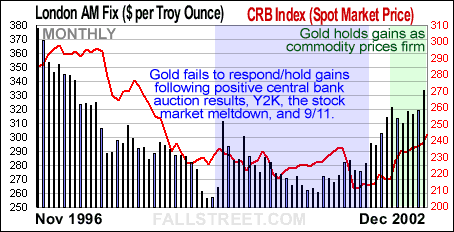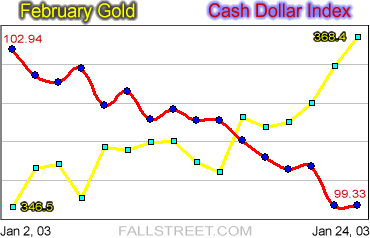January 27, 2003
U.S. To Attack The Declining Dollar
Specific mention by someone like Snow that the dollar is too low (weak) would open up a can of worms the U.S. has not had to deal with in decades.
The FTSE has dropped for a record 10 sessions in a row, gold is a bombshell away from surpassing $400 an ounce, and because Central Banks (Russia) are adjusting their foreign exchange holdings squeegee kids will soon be using greenbacks instead of rags. Is this the end of the world as we know it?
Embellishment aside, not only did the major stock markets decline last week, but the U.S. dollar continued to lose ground against most currencies. In fact, the dollar, which had been impervious to weakness for much of the last decade, has now dropped for a record 8 sessions in row versus the Euro. Does this mean the U.S. is about to officially back away from a strong dollar policy? In a word, no.
The Week Ahead: A U.N. Update, a Bush Speech, and a Snow Sound bite
U.N. inspectors are expected to give Iraq a ‘B’ when they update the U.N. Security Council today. Furthermore, chief U.N. inspector Hans Blix is expected to ‘to repeat his contention that the inspectors need at least several more months to do their work.’ Given these expectations and the fact that the U.S. is already facing strong opposition to a potential unilateral strike, ‘Bush will likely rattle his sabre, rather than unsheath it, when he delivers his State of the Union address tomorrow.’ (CP)
To note: these ‘expectations’ have been changing quickly: “His (Blix’s) staff said the speech would be stronger than originally anticipated...” AP
With most investor’s focused on the U.N. update and President Bush’s speech, (not to mention the FOMC meeting), only currency traders are left to worry about what U.S. Treasury nominee John Snow will have to say during his question-and-answer session before the Senate Finance Committee on Tuesday. This is unfortunate, because Mr. Snow’s words have the potential to steal the show this week:
“At the upcoming confirmation hearings for Treasury Secretary nominee John Snow on January 28, 2003, it is widely expected that Mr. Snow will be confronted with pointed questions on his position on the USD policy…I am looking for a new definition of USD policy that is more market determined and less focus on the directional bias. If I am right, such a definition would be an implicit endorsement of the on-going correction in the USD and would be consistent with the aggressively stimulative monetary and fiscal policy stance…” Stephen L. Jen, Morgan Stanley
If Mr. Jen’s USD policy outlook is correct the question begs to be asked: does a declining dollar mean the U.S. is ‘on the verge of a possible dollar crisis’ or does a declining dollar simply mean that all is going according to plan (that deflationary pressures are being rationally combated by a slumping dollar and U.S. companies are regaining exporting power)?
Suffice it to say, it is difficult to answer this question with any degree of accuracy. Rather, until the U.S. reaffirms its strong (or ‘stable’) dollar policy speculation is simply being layered upon speculation: you either believe the U.S. wants a weaker dollar or you don’t, and any opinion you have on the dangers/advantages associated with a slumping dollar feed off of this initial speculation.
To note: the White House half heartedly reaffirmed ‘no (dollar) policy change’ last week.
Snow’s Job
The reason why the U.S. will continue to back a strong dollar policy is because the dollar is in free fall. To be sure, the last thing the U.S. wants to do is to declare they back a weaker dollar, speed up the stampede out of the dollar, and then be forced into doing a flip flop: ‘now that the dollar has crashed we back a strong(er) dollar policy’?
As such, and within the context of trying to keep FX trading orderly, expect Snow to either back a strong dollar policy or avoid the question of dollar policy completely. As for Jen’s contention that the U.S. will begin focusing less on a ‘directional bias’ -- Central Banks and governments have interest rate and currency targets, and whether or not they share these targets with the public on a regular basis is decided on by how successful they are in achieving these targets. As such, discussing ‘directional bias’, much like the discussion of the Fed removing its interest rate bias from FOMC statements but still opting to hand this bias to the media from time to time, is pointless.
In short, Snow’s job is to either ensure that the dollar’s decline is orderly, or do everything possible to stop the decline. Snow doesn’t want to have to flip flop on the issue like he has already been forced to do on the topic of government deficits.
On a seemingly unrelated note, ‘Argentina Says It Can Lift Deposit Curbs by May’. What wasn’t included in this statement was that Argentina could also reenact such curbs by June. Snow had better select his words wisely...
|
Other reports that could impact trade this week include 4Q02 GDP, which many economists believe could come in below 1%. Corporate earnings will also continue to arrive en masse but are unlikely to control the direction of the markets early in the week.
Gold Shines
 |
Gold broke above $300 an ounce in early 2002 and has rallied with commodity prices ever since. However, gold’s most recent surge has not necessarily been related to broadly based commodity gains, but specifically to the U.S. dollar.
 |
It may be too early to predict an end to the gold rush. Quite frankly, with the U.S. dollar on the ropes -- a slumping dollar makes dollar denominated gold less expensive in places like Europe and Asia – there remains the potential for further gains. Moreover, until the Iraq situation is under control (which may or may not happen in the coming days) the impetus for players to dump just isn’t there.
Nevertheless, it is worth remembering that gold does not react like stocks do to steadily improving ROE gains or like most commodities do to improving supply/demand fundamentals. Rather, from time to time, and regardless of the supply/demand fundamentals of the underlying metal, mysterious forces tend to strike down the shiny metal. And while many believe that these forces are now under control, it is worth noting that similar beliefs were proffered in 1999 when gold surged to $325 an ounce. As it turned out, in just over a year gold lost more than 20%.
Time To Buy More Gold?
Those investors not already exposed to gold may be playing with fire if they expect to climb on board now and reap near term gains. However, our opinion on gold is not about to change for the long term investor: we continue to believe that gold stocks are risky (we sold our last gold stock holding in 2002) but hard gold should be apart of every investors portfolio.
“We continue to look at the gold arena fondly, and believe that as the equity bear becomes more entrenched gold could benefit as the U.S. dollar conversely drops.”
Wish List 2001 (Dec 26, 2000)
“We continue to look at the gold industry fondly…”
Wish List 2002 (Dec 26, 2001)
“We currently believe that gold stocks are risky and prefer owning the hard metal as a hedge against further U.S. dollar erosion.”
Wish List 2003 (Dec 26, 2002)
Incidentially, the silver lining in the gold story may, in fact, be silver itself. Gold’s baby brother is not participating in the latest rally but would certainly participate (historically logging a higher percentage increase) once, and if, the hoarding process begins.
Is this the end of the world as we know it?
The Fed is not preparing to admit defeat and adopt a gold standard. Rather, if the U.S. dollar continues to plunge look for a concerted effort to be undertaken to support the dollar. With Europe already complaining about a strengthening Euro and Japan always eager to fortify Yen weakness, organizing support for a stronger dollar campaign would appear to be easy task for Greenspan. Furthermore, and after being put out to pasture following the Mexico Peso intervention (94/95), the rarely used Exchange Stabilization Fund is likely to see more action should the dollar need support.
Point being, the decline of the U.S. dollar, and despite what Iraq happy gold may be suggesting, may not yet be critical. Until the first concerted effort arrives (and fails) to support the dollar don’t believe that the dollar’s demise suggests the end of freely floating currencies; that Greenspan has failed to slay gold. Rather, believe a rising gold price reflects an uptick in commodity prices and the threat of war with Iraq, and know that despite the flimsy dollar mysterious forces still lurk.
“…central banks stand ready to lease gold in increasing quantities should the price rise.”
Alan Greenspan. July 24, 1998
The financial world as we know it ends when everyone says ‘no thanks Greenspan – I don’t want to borrow gold, I want to own it!’ As it stands now, the price of gold may be headed higher but traders are more apt to cash out paper profits come expiration than take delivery, and investor’s chasing gold stocks still look to calculate paper gains/losses. Until investors are so terrified to own paper currency that they begin hoarding gold, a situation which occurred for a brief moment in Japan early last year, understand that a paper market is still a market central banks can work with.
In conclusion, when Snow or Greenspan begin to fret about the dollar’s decline is when the dollar situation begins to get interesting. Yes, this situation could arrive quickly and without warning – it may already be upon us!
The U.S. stands ready to attack, unilateral if need be, the declining dollar…
|
|
All data and information within these pages is thought to be taken from reliable sources but there is no guarantee as such. All opinions expressed on this site are opinions and should not be regarded as investment advice.
Copyright © 2000, 2001, 2002
FallStreet.com